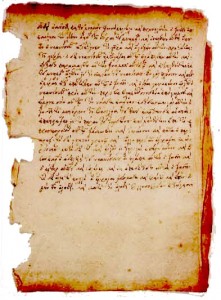 A couple of my buddies over at York University who study the appendix to the Bible (I think it’s called the New Testament :-)) also study some obscure stuff relating to the appendix (called the “Christian Apocrypha”). At any rate, they (I guess I can name them: Tony Burke and Phil Harland) are hosting a conference on the Secret Gospel of Mark at the end of April, 2011 at York University.
A couple of my buddies over at York University who study the appendix to the Bible (I think it’s called the New Testament :-)) also study some obscure stuff relating to the appendix (called the “Christian Apocrypha”). At any rate, they (I guess I can name them: Tony Burke and Phil Harland) are hosting a conference on the Secret Gospel of Mark at the end of April, 2011 at York University.
The conference, Ancient Gospel or Modern Forgery? The Secret Gospel of Mark in Debate, is the first of the York University Christian Apocrypha Symposium Series. More details may be found here.
If you are wondering what the “Secret Gospel of Mark” is, here is an excerpt from the conference website:
In 1958, American Biblical scholar Morton Smith made an astounding discovery in the Mar Saba monastery in Jerusalem. Copied into the back of a 17th century book was a lost letter by Clement of Alexandria (ca. 150-215 CE) containing excerpts from a longer version of the Gospel of Mark. This Secret Gospel of Mark, as it became known, is now one of the most debated texts of the Christian Apocrypha. More than fifty years after its discovery, there is still no consensus on the issues of its authenticity. Was the letter truly written by Clement of Alexandria? Or by a medieval or even modern forger? Was the forger Morton Smith himself? The debate has heated up in recent years with the publication of Stephen Carlson’s The Gospel Hoax: Morton Smith’s Invention of Secret Mark (Waco, TX: Baylor, 2005) and several criticisms of Carlson’s work by other scholars. Unfortunately, there has been no effective venue for these scholars to share their views on the text and arrive closer to a resolution of the issue of its authenticity. It is hoped that some progress can be made by bringing these scholars together to present their latest work on the gospel to each other, to an audience of interested scholars, to a curious public, and ultimately to an even wider audience with the publication of the papers and summaries of the discussion that arises from their gathering.
(Stephen Carlson, author of The Gospel Hoax, blogs over at hypotyposeis, often on Secret Mark)
I encourage you to check the conference out!
